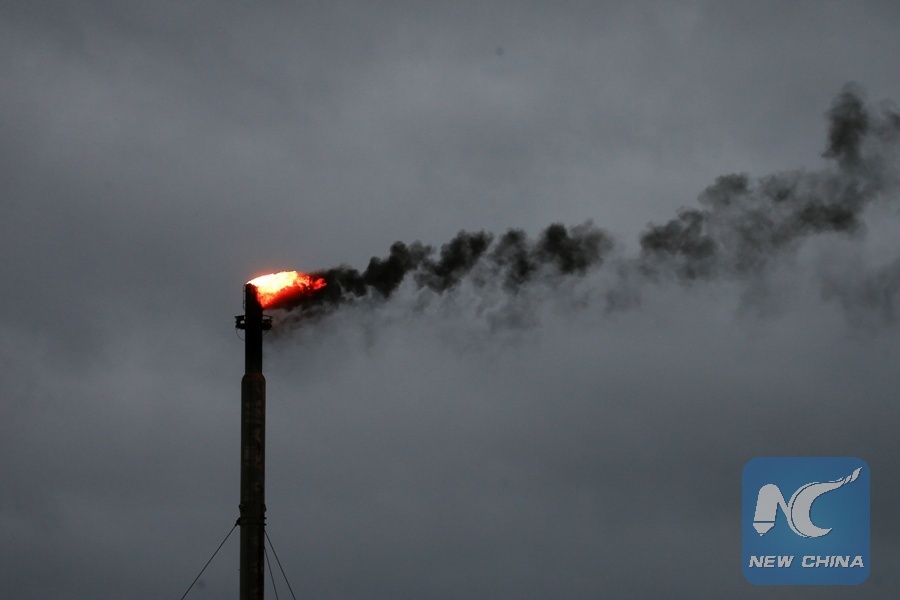
Clouds from Hurricane Harvey are seen in the background as smoke rises from a burn off at an oil refinery in Corpus Christi, Texas, U.S. August 26, 2017. (Xinhua/REUTERS)
by Xinhua Writer Sun Oumeng
NEW YORK, Aug. 30 (Xinhua) -- U.S. crude prices continued to decline and gasoline futures surged on Wednesday, as Hurricane Harvey shuts down more than 20 percent of U.S. refinery capacity, ripping through the heart of the oil industry.
Now tropical storm Harvey has ravaged Houston, home to several major U.S. refineries, and other parts of Texas.
Refineries were forced to shut operation in severe weather.
U.S. oil prices have fallen more than 5 percent since Thursday as the refinery shutdowns could reduce demand for American crude, while gasoline prices rose sharply.
The West Texas Intermediate (WTI) for October delivery lost 0.48 U.S. dollars to settle at 45.96 dollars a barrel on the New York Mercantile Exchange, while Brent crude for October delivery was down 1.14 dollars to close at 50.86 dollars a barrel on the London ICE Futures Exchange.
"The relative weakness in WTI is understandable given that pipeline closures are backing U.S. crude up in the Midland though the selloff in Brent appears to be more of a knee-jerk reaction to refineries shutting," Sam Alderson, an analyst of Energy Aspects, an independent research consultancy specializing in global energy markets, told Xinhua Wednesday.
The storm has partly widened the spread between the U.S. WTI and Brent, which is about the highest level in more than two years.
"We expect WTI to remain relatively weak relative to Brent in order to support exports of U.S. crude given domestic refinery disruptions, be it linked to flood damage or the upcoming refinery maintenance season, and the release of 14 mb (million barrels) of Strategic Petroleum Reserve crude in October/November," said Alderson.
Analysts said Harvey has had tragic effects on Texas and further heavy rain and floods could increase refining outages, tightening product and crude markets.
"We believe the extent of Harvey's impact on refining will evolve in the coming weeks with risk of higher or extended outages," said Benny Wong, an equity analyst of Morgan Stanley.
The analyst said:" The flooding and logistical impairments are the primary risk, not actual storm damage to facilities."
Even so, it will take refiners in the Houston area a while to fully recover to normal production.
Meanwhile, U.S. gasoline futures spiked 5 percent, hitting the highest level in more than two years.
"With the anticipated heavy rainfall and flooding, we believe Harvey's impact on refining will linger with risk of removing further refining capacity, tightening global product markets, elevating the system's profitability, and supporting the downstream sector," Wong added.
U.S. gasoline futures were up since it became clear that Harvey was going to be much stronger than a tropical storm.
Traders have shrugged off weekly inventory data on Wednesday, which showed stocks prior to the hurricane.
U.S. crude oil inventories fell 5.4 million barrels in the Aug. 25 week to 457.8 million, 7.6 percent below the level in the same week a year ago, according to data released by the Energy Information Administration.
Harvey made landfall in the coastal areas of Texas on Friday night as a Category 4 hurricane. It has since downgraded to a tropical storm, but the massive amount of rain it unleashed has caused widespread flooding in low-lying Houston, the fourth most populous U.S. city.
Tropical storm Harvey has broken the record for rainfall from a cyclonic storm in the U.S. mainland, with nearly 52 inches (132 cm) of rain observed in the state of Texas, authorities said on Tuesday.

